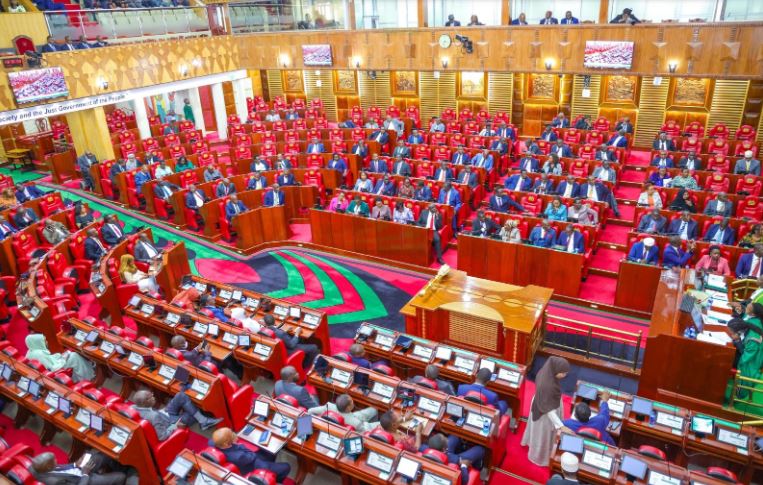
 A sitting of the National Assembly.
A sitting of the National Assembly.The House put the final question on the Bill on Thursday, June 19, during the afternoon sitting, following the conclusion of debate and the Third Reading on Wednesday night.
In the new Bill—now awaiting presidential assent—the Kenya Revenue Authority (KRA) was stripped of its proposed unfettered access to customer records.
The Bill is expected to raise Sh24 billion, down from the National Treasury’s initial estimate of Sh30 billion.
The projected revenue is part of the estimated Sh3.316 trillion in ordinary revenue for the 2025/26 fiscal year budget.
Finance and Planning Committee chairperson Kimani Kuria said on June 17 that the Bill carries the lowest revenue projections in the last three years of revenue-raising measures.
He revealed that the government had sought to collect Sh344 billion from the rejected Finance Bill, 2024, and later projected Sh49 billion from the Tax Laws Amendment Act, 2024.
“The Finance Act of 2022 had a projected revenue of Sh22 billion, the Finance Act of 2023 Sh211 billion, the defunct Finance Bill, 2024 Sh344 billion, and the Tax Laws Amendment Act, 2024 Sh49 billion. The Finance Bill, 2025, will only collect Sh24 billion,” said Kuria.
However, the House adopted the Finance and Planning Committee’s amendments, which rejected KRA’s proposal for unrestricted access to personal data for tax compliance, arguing that it violates Article 31(c) and (d) of the Constitution, which guarantees the right to privacy.
The committee noted that Section 60 of the Tax Procedures Act already provides sufficient authority for data access through judicial warrants.
Lawmakers also rejected a proposal to expand PAYE tax bands to 10 per cent, 17.5 per cent, 25 per cent, 27.5 per cent, and 30 per cent, which would have empowered the Treasury Cabinet Secretary to adjust rates by up to 10 per cent every three years to match inflation.
Additionally, the House opposed the Treasury’s proposal to reclassify certain commodities from zero-rated to exempt status.
MPs opted to retain zero-rated status for locally assembled mobile phones, motorcycles, electric bicycles, solar batteries, electric buses, animal feed inputs, and bioethanol vapour stoves.
On cooperative incentives, MPs rejected the proposal to eliminate the 15 per cent corporate tax rate for companies engaged in local motor vehicle assembly and the construction of at least 100 residential housing units.
Parliament also retained the Sh500 excise duty per litre on Extra Neutral Alcohol (ENA) for licensed spirituous beverage manufacturers, providing relief to players already burdened by increased duties.
Legislators supported a full tax exemption for all pension payments, whether received as lump sums or in installments, and repealed redundant provisions to enhance clarity.
In the amendments, the House approved an expanded definition
of Significant Economic Presence Tax (SEPT) to include websites and electronic
networks beyond digital marketplaces.
However, MPs rejected the proposed Sh5 million threshold,
arguing it would create revenue leakage loopholes and hinder KRA enforcement.
















